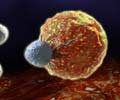Australian researchers have been successful in strengthening the immunity of a bone marrow transplant patient through T-cells grown in the laboratory. They were actually removed from the patient and exposed to man-made proteins before being injected back.
The experimental treatment by researchers from the Division of Immunology and the Australian Centre for Vaccine Development (ACVD) at Queensland Institute of Medical Research (QIMR) and the Bone Marrow Transplant unit at Royal Brisbane and Women’s Hospital (RBWH) is described as a world first.“In the case of leukaemia, patients often require a bone marrow stem cell transplant to eradicate the malignancy. As part of this procedure the recipient’s immune system often fails to function properly, leaving them highly susceptible to infection which can be life threatening,” explained Professor Geoff Hill.
In this case, the patient had been previously exposed to the human cytomegalovirus (HCMV) – a virus that often infects the lungs and gastrointestinal tract after transplantation. They developed immunity prior to the transplant and the virus had remained dormant. However, after the transplant their new donor immune system was unable to control the infection, in part because it had not been exposed to the virus previously.
The virus took hold and the patient developed severe and life threatening disease that could not be controlled by anti-viral drugs and the patient’s health dramatically declined.
With no other treatments available, experimental immunotherapy was used. T-cells are the body’s natural defence system. Different T-cells recognise and fight different viruses and bacteria protecting the body against infection. The patient’s T-cells were removed and exposed to man-made HCMV proteins. This generated large numbers of healthy T-cells ready and able to fight the virus.
“We believe removing the T-cells from the recipient gave them the chance to recuperate and multiply – it allowed the body’s defence system to regroup and re-arm itself against this deadly virus,” said Associate Professor Rajiv Khanna.
Advertisement
“What makes this research so exciting is for the first time we have given a patient long term protection against a virus that already existed in their body but which the donor cells were unable to fight – previously this was not thought possible”, said Professor Hill.
Advertisement
“However we have to be cautious as this procedure has only been used with one patient. The results are incredibly encouraging and the research teams at QIMR and RBWH are now embarking on a formal prospective clinical trial to thoroughly test this procedure,” explained Professor Hill.
This research was supported by funding from the Leukaemia Foundation of Queensland.
The results were published in the American Journal of Transplantation.
Source-Medindia
GPL











